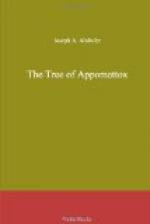It was a splendid column of men that rode out from the Union camp and General Sheridan himself saw them off. Colonel Winchester at their head was a man of fine face and figure, and he had never looked more martial. The hardships of war had left no mark upon him. His face was tanned a deep red by the winds of summer and winter, and although a year or two over forty he seemed to be several years less. Behind him came Dick, Pennington and Warner, hardy and well knit, who had passed through the most terrible of all schools, three and a half years of incessant war, and who although youths were nevertheless stronger and more resourceful than most men.
Near them rode the sergeant, happy in his capacity as scout and guide, and welcoming the responsibility that he knew would be his, as soon as they reached the mountains, looming so near and white. He felt as if he were back upon the plains, leading a troop in a great blizzard, and guarding it with eye and ear and all his five senses against Sioux or Cheyenne ambush. He was not a mere trainer of a squad of men, he was, in a real sense, a leader of an army.
Shepard, the spy, also felt a great uplift of the spirits. He was a man of high ideals, whose real nature the people about him were just beginning to learn. He did not like his trade of a spy, but being aware that he was peculiarly fitted for it intense patriotism had caused him to accept its duties. Now he felt that most of his work in such a capacity was over. He could freely ride with the other men and fight openly as they did. But if emergency demanded that he renew his secret service he would do so instantly and without hesitation.
Colonel Winchester looked back with pride at his column. Like most of the regiments at that period of the war it was small, three hundred sinewy well-mounted young men, who had endured every kind of hardship and who could endure the like again. All of them were wrapped in heavy overcoats over their uniforms, and they rode the best of horses, animals that Colonel Winchester had been allowed to choose.
The colonel felt so good that he took out his little silver whistle, and blew upon it a mellow hunting call. The column broke into a trot and the snow flew behind the beating hoofs in a long white trail. Spontaneously the men burst into a cheer, and the cold wind blowing past them merely whipped their blood into high exaltation.
But as they rode across the valley Dick could not help feeling some depression over its ruined and desolate appearance, worse now in winter than in summer. No friendly smoke rose from any chimney, there were no horses nor cattle in the fields, the rails of the fences had gone long since to make fires for the soldiers and the roads rutted deep by the rains had been untouched. Silence and loneliness were supreme everywhere.
He was glad when they left it all behind, and entered the mountains through a pass fairly broad and sufficient for horsemen. He did not feel so much oppression here. It was natural for mountains to be lonely and silent also, particularly in winter, and his spirits rose again as they rode between the white ridges.




